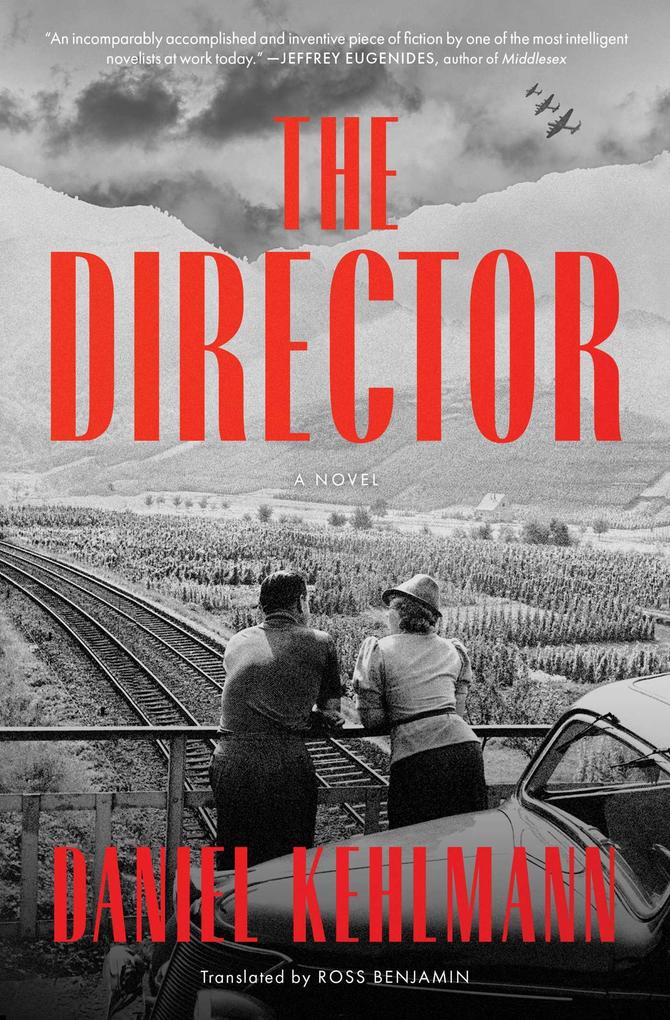"A treat for Literary cinephiles."
-Paul Schrader, director of First Reformed
"Kehlmann is really skillful about building the dread page by page. . . . Kehlmann has a wicked sense of humor. . . . so brilliant. . . I'm quite hot on this book. . . . I read it in one day. . . . I love this book."
-Joumana Khatib, The New York Times Book Review Podcast
"Haunting and darkly funny."
-Etan Nechin, Haaretz
"Exhilarating. . . a complex entertainment-a sorrowful fable of artistic and moral collapse, but also a novel composed with entrancing freedom, even bravura. . . [by] the leading German novelist of his generation. . . an irrepressible trickster, an endlessly fertile maker of fictional modes."
-David Denby, The New Yorker
"The Director, Kehlmann's stunning tale of what failure looks like, is a call to strengthen our spines."
-Susan Neiman, New York Review of Books
"A tasty subject for historical fiction. . . joins the pleasures of 'commercial' fiction with the moral weight of a novel of ideas."
-Maureen Corrigan, NPR's Fresh Air
"Powerful and timely."
-Jonathan Lemire, MSNBC'S Morning Joe
"Enthralling. . . thoroughly satisfying. . . both a vivid depiction of those circumstances and a captivating portrait of the artist navigating them."
-Malcolm Forbes, Washington Post
"Smartly entertaining. . . a marvelous performance - not only supple, horrifying and mordantly droll, but fluidly translated and absolutely convincing."
-J. Hoberman, The New York Times
"Engrossing. . . lands in the United States at a good time. . . . With a page-turning narrative that is both technically sophisticated and intellectually engaging, The Director sits at the charmed intersection of commercial and literary fiction."
-Julia M. Klein, Los Angeles Times
"With The Director, the author pushes his affinity for reimagining dark historical moments into yet more provocative territory. . . nothing short of brilliant."
-Donna Rifkind, Wall Street Journal
"Taut, unflinching. . . sharply observed. . . incisive, sweeping. . . arresting."
-Lauren LeBlanc, Boston Globe
"[Daniel Kehlmann] is a surpassingly gifted storyteller. Among his big influences are the filmmakers Joel and Ethan Coen. Like them, he is a master at depicting decent people making terrible choices, with results that are both droll and catastrophic. An atmosphere of moral queasiness permeates The Director, and the author is in perfect control of the barometric pressure."
-David Segal, The New York Times
"A freely imagined conjuring of the life and career of celebrated German-language film director G. W. Pabst by one of Germany's boldest contemporary novelists. . . . The sheer wizardry and audacity of the storytelling. . . masterfully dances along the cusp of realism and surrealism, comedy and tragedy. . . . An amazing performance by Kehlmann, who as a bonus immerses us in the filmmaking process. A wickedly entertaining, eye-opening book."
-Kirkus Reviews, starred review
"[Kehlmann] constructs a dark account of one man's descent into fascist complicity, a path strewn with surrealistic scenarios and chilling self-justifications in favor of art. . . Kehlmann's novel is purposefully unnerving and timely."
-Sarah Johnson, Booklist (starred review)
"Clear-eyed and propulsive. . . a searing look at the mechanics of complicity."
-Publishers Weekly (starred review)
"An incomparably accomplished and inventive piece of fiction by one of the most intelligent novelists at work today."
-Jeffrey Eugenides, author of Middlesex
"Daniel Kehlmann, the finest German writer of his generation, takes on the life of the eminent film director G. W. Pabst to weave a tragicomic historical fantasia that stretches from Hollywood to Nazi Germany, from Garbo to Goebbels, to show how even a great artist can make, and be unmade by, moral compromises with evil. A dazzling performance and a real page turner."
-Salman Rushdie, author of Knife
"The Director is engrossing and luminous, an epic act of historical imagination and an intimate parable about moral compromise and the seductions of art. After Tyll, I wasn't sure how Kehlmann could possibly top himself. He has. This book is a marvel."
-Ayad Akhtar, author of Homeland Elegies
"A wonderful book about complicity and the complicity of art. It's also funny, and brilliant."
-Zadie Smith, author of The Fraud, via the Ezra Klein Show
"Daniel Kehlmann is shockingly brilliant, a writer of extraordinary range and grace. At times absurdist, at times horrifyingly realist, The Director asks where the moral duty of the artist resides, and how the narcissism of the artistic project can bleed into complicity."
-Lauren Groff, author of The Vaster Wilds
"Arguably the best study of an artist corroded by fascism since Klaus Mann's Mephisto. Within it is possibly even a more interesting book on the unremarked tyranny of film-making that perhaps only the son of a director could have written."
-Richard Flanagan, Booker Prize winning author of The Narrow Road to the Deep North










